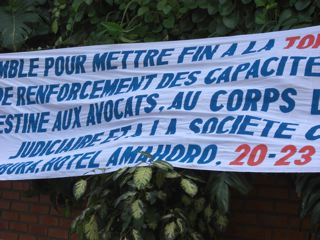
 |
The training was to begin on Tuesday, May 20th and we went to court on Monday to get a glimpse of the legal system to prepare for the session. The courthouse had seen better days. Many of the windows were broken and litter was strewn about. Inside the building people were milling about in the halls lethargically. Only one courtroom was conducting business that morning.Inside the courtroom three judges sat on their dais. Unlike the common law system, in civil systems there are no juries, just a panel of judges who function as fact finders and arbiters. |
There weren’t any court reporters, computers or clerks to update the files. The court dockets were stacked in a large pile on the bench. I could tell right away that getting justice in Burundi would be a painstaking, inefficient and labor-intensive process.
The courtroom, which would only be handling civil matters that day, was filled to capacity with citizens who would be appearing before the judges that day. In an American courthouse, you would see lawyers everywhere. In fact, there would be more lawyers than clients waiting in the halls. This was not the case in Burundi. Only two attorneys were present that day, excluding Mehdi and me. We later learned that there are only about 90 lawyers for the entire country. Of these lawyers, only a tiny percentage practice criminal law and all of them are concentrated in the capital of Bujumbura.
The first case called was a property dispute and no attorney appeared. One of the parties in the dispute approached the bench and the judges began to question him. Apparently the second party was not present. After some hemming and hawing, the magistrates decided that the case would have to be continued to allow the missing party to appear. If this case was a harbinger for the broader system, there would be more cases than would ever be resolved. There was a Sisyphean quality in that courtroom.
Later that day, I learned about the enormous problems the criminal courts tackle while trying to manage their criminal calendars. There is no infrastructure to transport prisoners from jails to courthouses. There are no vehicles to take judges to the provinces to hear cases near the detention centers. On top of these challenges, the judicial system had recently been shut down by a series of strikes. Before arriving we had been warned to expect a nationwide, week-long judges’ strike to protest the 40% reduction of their wages. The clerks had been on strike just a week before. The judges planned to strike one week every month until their salary demands were met. The unstructured, unproductive quality of the court setting made me wonder what happened to people in jail during these strikes.
| After court we met the Minister of Justice, Jean Bosco Ndikumana. He was very forthright in expressing his aspirations for improving the judiciary system and implementing good laws to help the people. He said he wanted more than anything to build a system of laws that would help people live in peace and security. He said he welcomed our participation in rebuilding the defender system in his country. Unfortunately, when we began to speak of specific plans to build 12 defender resource centers he continued smiling at us, like any good politician would, but his eyes seemed to lose focus and glaze over. |  |
Our next meeting was with Anaclet Gasamirwa, the Director General of Prisons, was more productive. Like Mr. Ndikumana, he shared his frustrations with us. He lamented over the lack of progress he had in reducing the number of people languishing in prisons awaiting access to courts at the pretrial stage of the proceedings. He confirmed the lack of a transportation system to deliver prisoners to court appearances. He told us that of those waiting in custody, nearly 70% are awaiting trial and are presumed to be innocent. Yet they will wait together with the condemned, the petty thieves and the most serious criminals for months, even years, before their cases can be resolved. We learned that the more serious cases often get more attention and are resolved quickly, leaving the run of the mill cases waiting forever to access the limited resources. He concluded that the failure to provide early access to counsel was the major cause of the jail overpopulation. All the prisons in the country are housed beyond capacity. The conditions are deplorable. The most disturbing revelation was the fact that men, women and children are housed together.